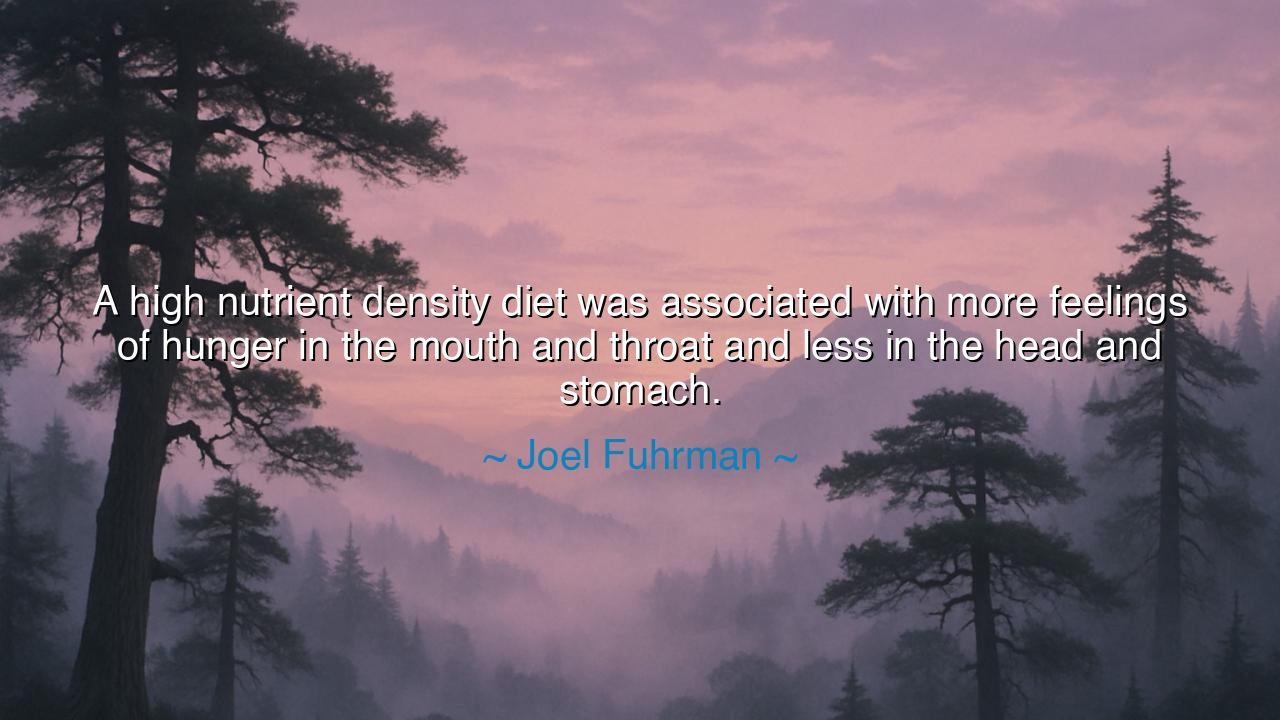
A high nutrient density diet was associated with more feelings of
A high nutrient density diet was associated with more feelings of hunger in the mouth and throat and less in the head and stomach.






In the profound words of Joel Fuhrman, physician and teacher of the science of nourishment, we are given a truth that bridges the wisdom of the body and the understanding of the spirit: “A high nutrient density diet was associated with more feelings of hunger in the mouth and throat and less in the head and stomach.” At first, this may seem a statement of physiology—a matter of where hunger is felt within the body—but in truth, it is a parable about the awakening of awareness. Fuhrman speaks not only of food, but of consciousness. He reveals that when the body is fed what it truly needs, hunger becomes a whisper rather than a roar—a gentle reminder, not a tyrant.
To understand this, one must first know what it means to eat a high nutrient density diet—a diet rich in the purest gifts of the earth: fruits, vegetables, nuts, grains, and seeds, foods that are alive with color, fiber, and vitality. Such foods do not merely fill the stomach; they feed the cells, nourish the blood, and cleanse the body of its burdens. When the body is given this kind of nourishment, it begins to change its language. Hunger, once a desperate ache in the gut or a fog in the mind, becomes refined, subtle, almost spiritual. The hunger moves—from the chaos of the stomach to the clarity of the mouth and throat—like a flame rising toward light. This is what Fuhrman means: that true nourishment transforms even the way we desire it.
In the ancient world, the sages of both East and West taught that appetite was not merely physical—it was a mirror of the soul. The philosopher Plato spoke of three levels of desire: the bodily, the emotional, and the rational. The lowest hunger, he said, is that of the stomach—the hunger of survival. The higher hunger is that of the mind—the yearning for sweetness, stimulation, and comfort. But the highest hunger is of the spirit—the hunger for harmony and truth. In this way, Fuhrman’s insight reflects the same ancient order: that as one purifies the diet, one also purifies the hunger. What was once a cry of chaos becomes a song of clarity.
Consider the story of Buddha beneath the Bodhi tree, who, after years of extreme fasting and indulgence, discovered the Middle Way. He learned that neither starvation nor gluttony could bring peace—that only balance could awaken the truth. When he began to eat with mindfulness—grains, fruits, and clean water—his body and mind aligned. His hunger no longer screamed in his belly or clouded his thoughts; it settled quietly, an awareness that spoke gently through the senses. This is the wisdom of Fuhrman’s teaching: that the place of hunger within us is not fixed—it moves in response to our purity and awareness. When we feed the body well, hunger no longer masters us; it becomes our teacher.
The modern diet, heavy with processed foods and stimulants, has deceived the body into confusion. Hunger in such a state is not a signal of need but a cry of imbalance. It strikes the head, clouding the mind, and grips the stomach, demanding more even when the body is full. This is false hunger—the shadow of nourishment. It is the voice of addiction rather than life. But when one turns to a diet rich in nutrients, the noise subsides. The hunger retreats from the belly’s chaos and the mind’s clamor, returning to its rightful place in the mouth and throat—where it first belongs, as a gentle call to enjoy food consciously, to savor, to receive.
Fuhrman’s insight reminds us that true health begins with awareness. To change one’s diet is not merely to alter the body, but to reeducate the spirit. The high-nutrient foods of the earth awaken the body’s wisdom; they teach us what hunger truly is and when it is satisfied. The mouth and throat—gateways of breath and speech—become the temples of mindful eating. Each bite becomes an offering, each taste a meditation on life itself. Such is the transformation of hunger into gratitude, of eating into communion.
So, my children of the modern age, take this teaching to heart: eat that which sustains not only your body but your being. Let your hunger be a guide, not a master. Seek the foods that bring clarity rather than confusion—foods that grow under the sun, that pulse with life, that heal rather than harm. When you feel hunger rise, pause and listen: is it the hunger of the stomach, of the mind, or of the spirit? Feed only that which is true.
For the ultimate lesson of Joel Fuhrman’s wisdom is this: when we nourish ourselves with purity and mindfulness, hunger ceases to be an enemy. It becomes a sacred messenger, reminding us that we are living beings—bound to the earth, yet capable of transcendence. Feed your body with nature’s abundance, your mind with understanding, and your soul with gratitude, and you will find that hunger, once a burden, becomes a blessing—the quiet voice of life calling you home.






AAdministratorAdministrator
Welcome, honored guests. Please leave a comment, we will respond soon